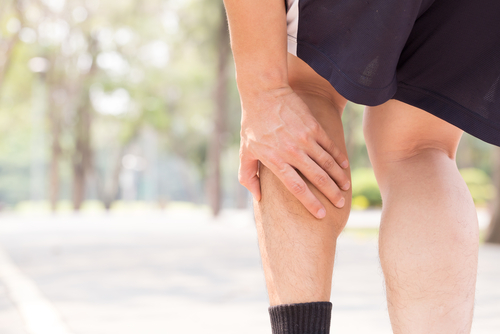Even though your lower legs and calves do a lot of work on a day-to-day basis, that doesn’t mean it’s normal to be in pain. Leg pain can have many causes, some less and some more serious, so if you experience it frequently, it’s best to see a doctor. In the meanwhile, here are some of the most common lower leg and calf pain causes to learn about.
Muscle strain
Calf muscle strain (medial gastrocnemius strain) is one of the most common causes of acute calf pain. This injury usually occurs during intense exercise or sports activity when you have to push your body suddenly like when sprinting or jumping. The pain that follows calf muscle strain is sudden, sharp and accompanied with a tearing sensation. If the strain is very severe, it can also cause bruising and swelling.
Muscle contusions
Calf muscle contusion often occurs after a direct hit to the muscle or the lower leg. It’s mostly followed by swelling and bruising due to burst blood vessels and is accompanied by sharp pain and even hematoma in severe cases.
Muscle cramps
Most times, calf pain is caused by muscle spasms or cramps. These involuntary contractions can appear in one calf only or in both of them at the same time. People who experience them often describe them as intensely painful, sometimes associated with stiffness and visible knots in the muscle. Even though you can’t really control these spasms, they are often short-lived and can be stopped with stretching. If you often experience calf cramps, try to drink more water and practice good stretching before and after you exercise. Additionally, many professional athletes opt for compression leggings which increase blood flow to the muscles and thus prevent post-workout soreness and cramps. You can find best compression leggings reviews and ratings online which will help you find the right pair for you and your needs.
Tendonitis
The biggest tendon in the human body, Achilles tendon, connects your calf muscle to your heel. When this tendon becomes irritated (usually because of overuse) it can cause sharp, burning pain just above the heel. It can also be followed by calf pain and stiffness of the muscle. However, Achilles tendon can also tear or rupture which causes intense and sudden pain in the back of the leg with the inability to put any weight on the leg. Stretching and strengthening your calf muscles can prevent tendonitis and make physical activity much more pleasant.
Blood clots
Sometimes, blood clots form in the deep leg veins and cause symptoms like swelling, warmth, redness and cramping feeling in the calves. Deep vein thrombosis often appears in older individuals, pregnant women, obese people, those with cancer or those who underwent certain surgical procedures. Blood clots can be very dangerous because they can travel to your lungs and cause a pulmonary embolism.
Varicose veins
Many people are familiar with varicose veins because they can be seen at the surface of the leg. They appear as dark blue (even purple) and twisting veins caused by weak vein walls and valves. After long periods of standing, they can cause a dull ache. Varicose veins can be supported by special stockings that, but you can also switch between standing and sitting positions throughout the day to relieve pressure and pain.
Arterial disease
When arteries in your legs get damaged and harder, they get narrower and even blocked which causes a shortage of blood in your legs. This can cause muscle cramps and pain during walking, climbing stairs and other physical activities. With this disease, resting is one of the best cure (unless your arteries are very damaged and blocked). People who are at risk of this disease are diabetics, people with high cholesterol, high blood pressure and high body weight. If you eat better, manage your weight, exercise and quit smoking, you can relieve and even remove your symptoms.
Sciatica
Sometimes, a spinal disc gets herniated and starts putting pressure on nerves. This leads to sciatica symptoms which include cramping in legs, numbness, tingling, weakness and fatigue. The pain can start in the back or in the hip, but it can extend down and affect your leg. Since rest doesn’t help this condition, the treatment is a little more demanding. Anti-inflammatories and pain medication, as well as cold and hot compresses, help with pain and some other symptoms. Physical therapy, stretching and exercise also work well. If the pain doesn’t stop, doctors even recommend surgery.
Baker’s cyst
Actually, Baker’s cyst is not a real cyst but knee-joint fluid that collects at the back the knee. When this cyst bursts, the fluid can leak into the calf muscle and cause pain accompanied by swelling. It’s often caused by arthritis or a cartilage tear and treatment of underlying conditions often helps with the cyst itself.
Compartment syndrome
This painful condition occurs in the calf muscle of one or both legs, usually after some sort of trauma or injury. It usually starts when excess blood or fluid builds up underneath the body’s tough tissues which can’t stretch. This causes pressure on surrounding nerves and blood vessels in the leg and triggers pain, swelling, tingling or numbness. Compartment syndrome can also be chronic. This usually occurs when a person is exercising which results in pain. Chronic compartment syndrome also includes numbness, but can also cause difficulty moving the foot or visible enlargement of the muscle.
Nerve entrapment
If your calf muscle is swollen or enlarged, it can put pressure on surrounding nerves and cause numbness, tingling or sharp pain. Most nerves that get entrapped are sural nerve and peroneal nerve. Sometimes, peroneal nerve entrapment can cause muscles to become weak and the foot to drop.
Diabetic neuropathy
This condition occurs at people who experience nerve damage due to diabetes. Sometimes, high blood sugar levels can be damaging to nerves, usually in hands and lower legs. While the symptoms are usually connected to numbness or tingling, sharp shooting pain and discomfort can also appear in the calf muscle. While some of these issues can be handled at home (muscle cramps), others require medical assistance, so don’t hesitate to see your doctor and ask for advice. Your legs supported you all this time, now it’s time for you to support them!
Conclusion
If you’re experiencing leg pain or sore calves, here’s what to keep and mind and what to ask your doctor about.







